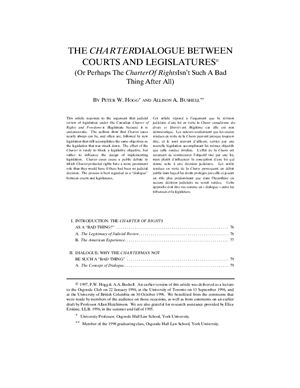Published by Osgoode Hall Law School, York University
This article responds to the argument that judicial
review of legislation under the Canadian Charter of
Rights and Freedoms is illegitimate because it is
undemocratic. The authors show that Charter cases
nearly always can be, and often are, followed by new
legislation that still accomplishes the same objectives as
the legislation that was struck down. The effect of the
Charter is rarely to block a legislative objective, but
rather to influence the design of implementing
legislation. Charter cases cause a public debate in
which Charter-protected rights have a more prominent
role than they would have if there had been no judicial
decision. The process is best regarded as a dialogue
between courts and legislatures.
This article responds to the argument that judicial
review of legislation under the Canadian Charter of
Rights and Freedoms is illegitimate because it is
undemocratic. The authors show that Charter cases
nearly always can be, and often are, followed by new
legislation that still accomplishes the same objectives as
the legislation that was struck down. The effect of the
Charter is rarely to block a legislative objective, but
rather to influence the design of implementing
legislation. Charter cases cause a public debate in
which Charter-protected rights have a more prominent
role than they would have if there had been no judicial
decision. The process is best regarded as a dialogue
between courts and legislatures.

